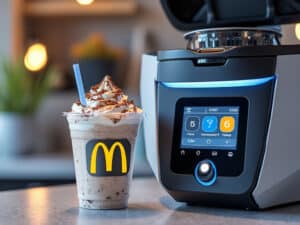In a surprising twist that might seem unrelated at first glance, the recent legal victory for McDonald’s and their ice cream machines offers a parallel to the ongoing issues with the Intoxilyzer 9000 used in DUI cases. This blog post delves into how the same principles of proprietary protection are at play in both scenarios, and what this could mean for DUI defense strategies.
The McDonald's Ice Cream Machine Dilemma For years, McDonald's locations across the U.S. have struggled with malfunctioning McFlurry machines, often leaving customers disappointed. The issue stemmed from the digital locks placed on these machines by Taylor, their manufacturer, which prevented anyone but their authorized service providers from repairing them. https://qz.com/mcdonalds-mcflurry-machines-court-ruling-fix-consumers-1851683076
- The Fix: The U.S. Copyright Office recently granted an exemption under the Digital Millennium Copyright Act (DMCA), allowing for the legal bypassing of these digital locks for repair purposes. This move was championed by Public Knowledge and iFixit, aiming to empower third-party technicians to fix these machines, enhancing efficiency and customer satisfaction.
The Intoxilyzer 9000 and DUI Defense
Similarly, CMI, Inc., the manufacturer of the Intoxilyzer 9000, has long kept the device's computer source code under wraps. This breathalyzer is used nationwide to measure BAC (blood alcohol concentration) in DUI cases, and its accuracy is paramount for legal proceedings.
- Secrecy Tactics: Like Taylor with the McFlurry machines, CMI uses proprietary tactics to prevent the examination of the Intoxilyzer 9000's computer source code. This secrecy makes it challenging for defense attorneys to challenge the reliability or accuracy of the machine's results in court.
Legal and Ethical Implications
1. Right to Repair vs. Right to Defend:
- While the right to repair has been acknowledged for commercial equipment like ice cream machines, the legal right to inspect proprietary technology used in criminal cases remains contentious. This raises questions about fairness and transparency in legal evidence.
2. Potential for Legal Challenges:
- The exemption granted to McDonald's could set a precedent. Defense attorneys might argue that similar access should be provided to scrutinize the computer software and algorithms of devices like the Intoxilyzer 9000, especially when the results could lead to convictions.
3. Consumer and Defendant Rights:
- Just as consumers have been frustrated with non-functional ice cream machines, defendants in DUI cases face significant life impacts from potentially unreliable or unchallenged breathalyzer results.
- Advocacy for Access: There's an increasing call for transparency in technology used in legal contexts. Legal teams might push for laws or exemptions akin to the DMCA's repair clause, allowing for the examination of source codes or algorithms in devices that directly affect criminal DUI convictions.
- Educational Role: Defense attorneys could use these parallels to educate juries and judges about the implications of proprietary technology in legal settings, potentially influencing how evidence is viewed and challenged.
The saga of McDonald's ice cream machines highlights a broader issue of proprietary control over technology that affects public services and rights. As Elon Musk has famously stated that "patents are for the weak," suggesting that they are often used more as a defensive tool rather than a means to foster innovation. He views patents as potentially stifling progress by being used by large corporations to entrench their positions rather than promoting inventiveness. For DUI defense, understanding these parallels can offer new strategies for challenging breathalyzer evidence, advocating for a system where technology used in legal proceedings is transparent and accountable. If McDonald's can get its machines fixed, perhaps it's time for the legal system to ensure the same level of scrutiny for devices determining guilt or innocence.
Contact Us Today
For a free consultation, contact the Law Offices of George Creal today on the web at www.georgecreal.com or on the phone at (404) 333-0706. We are here to help you navigate the legal system and fight for your rights.
Disclaimer
The information in this blog post is for general informational purposes only and should not be construed as legal advice. Please consult with an attorney to discuss your specific legal situation.

